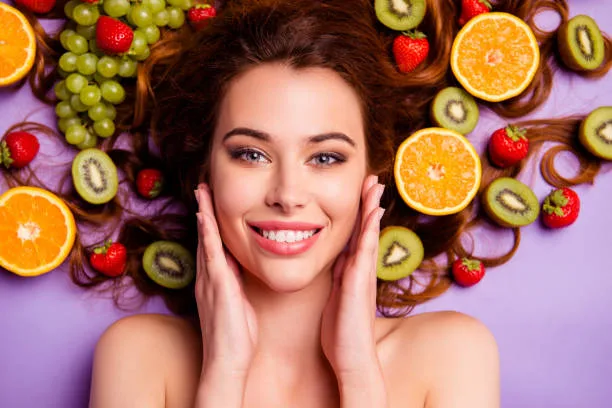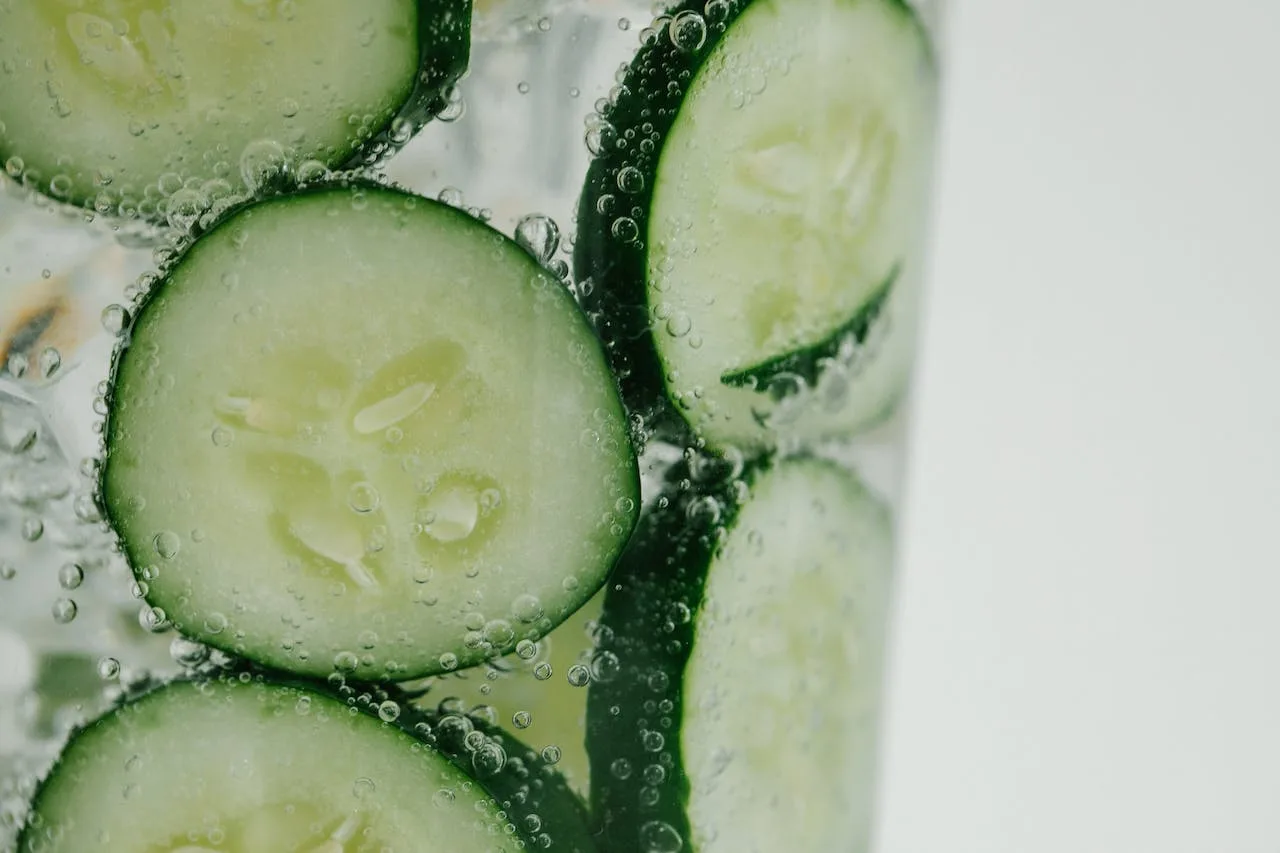Introduction
The quest for radiant, healthy skin is a universal pursuit. While skincare products and routines can help maintain and enhance the quality of our skin, true skin health often begins from within. The foods we consume play a significant role in nourishing our skin and can have a profound impact on its overall appearance and vitality. In this article, we will explore the concept of “Healthy Skin from Within” and provide valuable nutrition tips to help you achieve that coveted youthful glow.

Table of Contents
Healthy Skin From Within
Hydration is Key

Before delving into the specifics of nutrition, it’s crucial to emphasize the importance of proper hydration. Staying well-hydrated is the foundation of healthy skin. Water is vital for maintaining the skin’s moisture balance, preventing dryness, and promoting a supple, dewy complexion. Try adding cucumber, lime or lemon to enhance the flavour, if you find plain water boring. Aim to drink at least 8 glasses of water a day to keep your skin adequately hydrated.
Antioxidant-Rich Foods

Antioxidants are your skin’s best friends. They help protect your skin from damage caused by free radicals and environmental factors. Incorporate foods rich in antioxidants into your diet, such as:
- Berries (blueberries, strawberries, and raspberries)
- Dark leafy greens (spinach, kale, and Swiss chard)
- Nuts and seeds (especially walnuts and sunflower seeds)
- Sweet potatoes
- Green tea
- Carrots
- Tomatoes
These foods provide your skin with a defence against premature ageing and skin conditions like wrinkles, fine lines, and age spots.
Omega-3 Fatty Acids

Omega-3 fatty acids are essential for maintaining the skin’s lipid barrier, which helps lock in moisture and keep irritants out. Foods rich in omega-3s include:
- Fatty fish (salmon, mackerel, sardines)
- Chia seeds
- Flaxseeds
- Walnuts
- Hemp seeds
Including these foods in your diet can help keep your skin well-hydrated and reduce inflammation.
Vitamins and Minerals
Certain vitamins and minerals are essential for skin health. They include:

- Vitamin C: This vitamin supports collagen production and helps fight skin ageing. Find it in citrus fruits, strawberries, and bell peppers.
- Vitamin E: An antioxidant that can help protect your skin from sun damage. You’ll find it in almonds, sunflower seeds, and spinach.
- Vitamin A: Essential for skin cell production and repair. Foods like sweet potatoes, carrots, and dark leafy greens are rich sources.
- Zinc: Promotes skin healing and can be found in foods like whole grains, nuts, and beans.
Collagen-Boosting Foods
Collagen is a protein that keeps your skin firm and elastic. As you age, collagen production naturally decreases, leading to sagging skin and wrinkles. You can help your body produce collagen by consuming:
- Bone broth: Contains collagen and essential amino acids.
- Citrus fruits: Rich in vitamin C, which is essential for collagen production.
- Lean protein sources: Chicken, fish, and lean cuts of beef provide amino acids necessary for collagen synthesis.
- Soy products: Soy contains genistein, a compound that may promote collagen production.
Healthy Fats

Incorporating healthy fats into your diet can have a positive impact on your skin’s appearance and texture. Avocado, for example, is a great source of healthy monounsaturated fats that can help keep your skin hydrated and soft. Olive oil is another good option to include in your cooking and salads. These fats provide essential fatty acids that maintain the skin’s moisture.
Probiotics for Gut Health
The health of your gut is intricately connected to the health of your skin. Probiotics, found in fermented foods, help maintain a healthy balance of gut bacteria. A healthy gut microbiome can reduce inflammation, which is a common cause of skin issues. Incorporate probiotic-rich foods like yoghurt, kefir, sauerkraut, and kimchi into your diet.
Whole Grains for Skin Health

Whole grains are packed with fibre, which helps regulate blood sugar levels. Spikes in blood sugar can lead to skin issues like acne. Opt for whole grains like quinoa, brown rice, and whole wheat pasta to maintain stable blood sugar and support clear skin.
Avoid Processed Foods and Sugar
Processed foods are often loaded with sugar, unhealthy fats, and additives that can wreak havoc on your skin. Excessive sugar consumption can lead to inflammation, breakouts, and accelerated ageing. Limit your intake of processed foods, sugary snacks, and sugary drinks to maintain healthy, clear skin.

The Power of Green Tea
Green tea is a skin-loving beverage filled with antioxidants. It can help protect your skin from sun damage and reduce the risk of skin cancer. Enjoy a cup of green tea regularly to reap its skin-boosting benefits.
Conclusion
Achieving healthy skin from within is not just a matter of applying skincare products. It’s about nurturing your body with the right nutrients to support your skin’s natural processes. By incorporating hydration, antioxidants, omega-3 fatty acids, vitamins, minerals, and collagen-boosting foods into your diet, you can take significant steps toward achieving radiant, healthy skin.

Additionally, maintaining a healthy gut with probiotics, choosing whole grains over processed foods, and avoiding excess sugar will help you maintain clear, youthful skin. Remember, it’s not just about looking good; it’s about feeling good and nurturing your skin’s health for the long term. Your skin will thank you for the care you provide from within.
FAQs
Why is proper hydration essential for healthy skin?
Proper hydration is essential for healthy skin because water helps maintain the skin’s moisture balance, prevents dryness, and promotes a supple, dewy complexion. Without adequate hydration, the skin can become dry, flaky, and prone to various issues.
How do antioxidants contribute to skin health, and which foods are rich in antioxidants?
Antioxidants play a crucial role in protecting the skin from damage caused by free radicals and environmental factors. Foods rich in antioxidants include berries (blueberries, strawberries, and raspberries), dark leafy greens, nuts and seeds, sweet potatoes, green tea, carrots, and tomatoes.
What are omega-3 fatty acids, and how do they benefit the skin?
Omega-3 fatty acids help maintain the skin’s lipid barrier, which locks in moisture and keeps irritants out. They promote well-hydrated and less inflamed skin. Sources of omega-3s include fatty fish (salmon, mackerel, sardines), chia seeds, flaxseeds, walnuts, and hemp seeds.
How can vitamins and minerals influence skin health, and which foods contain these essential nutrients?
Vitamins and minerals are essential for skin health. For example, vitamin C supports collagen production and can be found in citrus fruits, strawberries, and bell peppers. Vitamin E is an antioxidant that protects the skin and is present in almonds, sunflower seeds, and spinach. Vitamin A, which is vital for skin cell production and repair, can be found in foods like sweet potatoes, carrots, and dark leafy greens. Zinc, important for skin healing, can be obtained from whole grains, nuts, and beans.
What role does a healthy gut microbiome play in skin health, and how can probiotics help?
A healthy gut microbiome is linked to clear and healthy skin. An imbalanced gut can lead to inflammation, a common cause of skin issues. Probiotics, found in fermented foods like yoghurt, kefir, sauerkraut, and kimchi, help maintain a balanced gut microbiome, reducing the risk of skin problems and promoting skin health.



